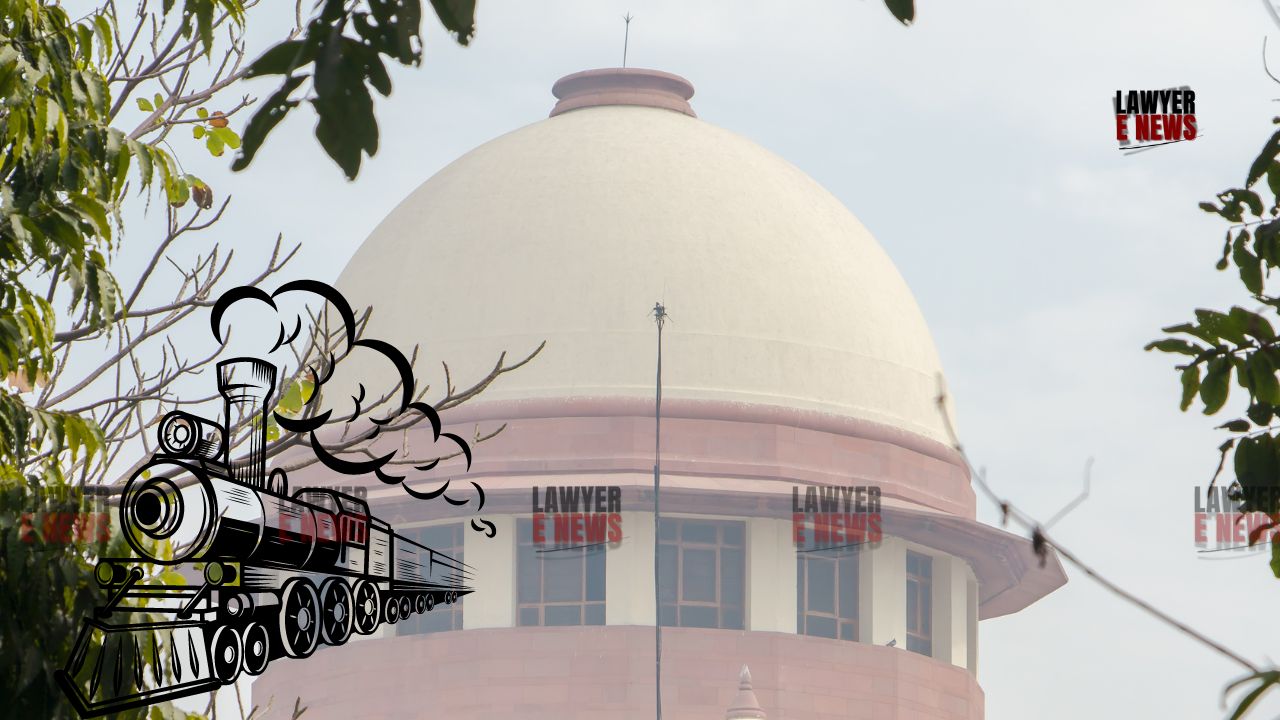-
by Admin
15 February 2026 2:36 AM



"Section 143 of the Railways Act prohibits unauthorized procurement and supply of railway tickets, irrespective of whether the tickets are physical or digital. The provision must adapt to technological advancements while staying true to its legislative purpose," the Supreme Court clarified.
Supreme Court addressed the scope and applicability of Section 143 of the Railways Act, 1989, in the context of unauthorized procurement and supply of railway e-tickets. The Court restored criminal proceedings against Mathew K. Cherian, who was alleged to have illegally created user IDs for ticket procurement but quashed proceedings against Ramesh, an authorized railway agent, finding no statutory violation.
This ruling has significant implications for the prosecution of ticketing offenses in an era dominated by e-ticketing and online platforms.
The appeals stemmed from two separate cases involving the alleged misuse of railway ticketing systems. In the lead case, Mathew K. Cherian, Managing Director of a finance company, was accused of operating an unauthorized business of railway ticket procurement by creating multiple fake user IDs on the IRCTC portal. The Kerala High Court quashed criminal proceedings against him, reasoning that Section 143 of the Railways Act was not applicable to e-ticketing.
In the connected case, J. Ramesh, an authorized agent operating a travel agency, faced charges of using multiple personal user IDs for ticket procurement. The Madras High Court refused to quash criminal proceedings against him, holding that his actions violated Section 143 despite his authorized status.
Both cases were brought before the Supreme Court for final adjudication.
The Supreme Court emphasized that Section 143 is technology-neutral and its language is broad enough to encompass e-ticketing systems. The provision’s legislative intent is to eliminate unauthorized ticketing, regardless of the mode of ticket procurement—physical or digital.
"The mere fact that e-ticketing was introduced after the enactment of the Railways Act does not render Section 143 toothless. The provision applies to both traditional and modern methods of ticket procurement," the Court observed.
Citing Senior Electric Inspector v. Laxminarayan Chopra (1962), the Court held that statutory provisions must evolve with technological advancements if the language permits.
The Court clarified the distinction between unauthorized and authorized agents under Section 143:
Unauthorized Agents: Mathew was neither a railway servant nor an authorized agent. His actions of creating fake user IDs and selling tickets for profit fell squarely within the purview of Section 143.
Authorized Agents: Ramesh, being an authorized agent, was not subject to prosecution under Section 143 for alleged misuse of multiple user IDs. Breaches of IRCTC rules by authorized agents require civil remedies, not criminal prosecution.
"Section 143 penalizes unauthorized procurement and supply but does not criminalize unauthorized actions by authorized agents," the Court stated.
Kerala High Court’s Error in Quashing Proceedings Against Mathew: The Court found the Kerala High Court’s reasoning flawed, as it failed to recognize that Section 143 applies irrespective of the medium (physical or online) used for ticket procurement. Mathew's actions prima facie constituted an offense under Section 143.
Madras High Court’s Error in Refusing to Quash Proceedings Against Ramesh: The Court held that the Madras High Court wrongly interpreted Section 143 to criminalize actions of an authorized agent. The allegations against Ramesh did not amount to an offense under Section 143 and required civil remedies instead.
Statutory Interpretation and Technological Evolution
"Statutory provisions must adapt to the realities of technological advancements. The introduction of e-ticketing does not dilute the intent of Section 143 to regulate unauthorized ticketing businesses," the Court stated.
The Court relied on precedents such as Dharani Sugars and Chemicals Ltd. v. Union of India (2019) to reinforce the principle that statutory language should be interpreted to cover new developments if its wording allows.
The Court reiterated the principle of strict interpretation of penal statutes, observing:
"Section 143 must be construed narrowly. It criminalizes actions of unauthorized agents but does not extend to breaches of IRCTC rules by authorized agents."
This distinction underscores the need for proportionate responses—criminal remedies for unauthorized actions and civil remedies for contractual breaches.
Lead Appeal (Mathew K. Cherian): The Court allowed the appeal, restoring criminal proceedings against Mathew under Section 143 of the Railways Act.
Connected Appeals (J. Ramesh): The Court quashed criminal proceedings against Ramesh, holding that his actions, though serious, did not attract Section 143.
"Mathew must face trial under Section 143, while Ramesh cannot be proceeded against criminally for breaches of IRCTC rules," the Court concluded.
The Supreme Court’s ruling establishes clarity on the application of Section 143 of the Railways Act in the digital age. By distinguishing between authorized and unauthorized agents, the Court balanced the objectives of the Railways Act with the principles of statutory interpretation and fairness.
This judgment is expected to deter unauthorized ticketing practices while protecting authorized agents from criminal prosecution for regulatory breaches.
Date of Decision: January 9, 2025
